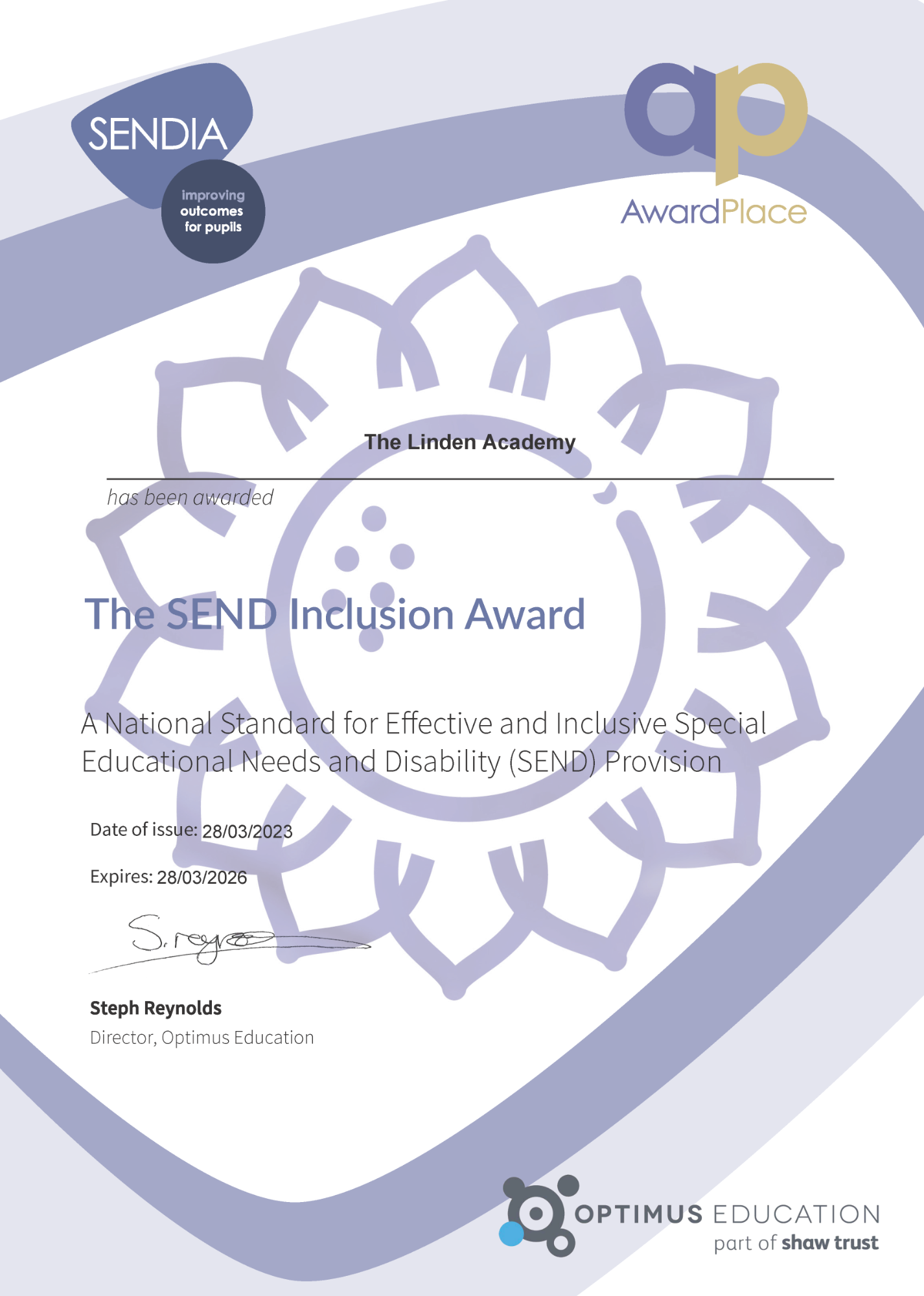Special Educational Needs & Disabilities (SEND)
We have a strong and well-developed SEND provision that supports children with Special Educational Needs and disabilities (SEND). The dedicated team work with staff and children in classrooms to help them achieve their very best, as well as providing a package of support in and outside of the classroom to meet the needs of each child.

D Washington
Assistant Principal and TSLT Director of Inclusion and Trust SENCO
Email: d.washington@thesharedlearningtrust.org.uk

S Basye
Director of Inclusion and Operations
Email: s.basye@thesharedlearningtrust.org.uk
Parental SEND Referral Form
If you feel you are concerned about your child's progress or you feel they may have a learning difficulty or disability, please complete the SEND referral form and email to the address on the top of the form. The SENCO or Assistant SENCO will be in touch to discuss how they can support your child.
Our SEND Policy
Our Special Educational Needs and Disability (SEND) policy has been written with regard to the Special Educational Needs and Disabilities Code of Practice: 0-25 years (June 2014) and the Equalities Act (2010).
Pupils will be identified through on-going assessments by the child or young person’s teachers, and brought to the attention of the SENCO if they are making less than expected progress, in spite of high quality, differentiated classroom teaching targeted at the child or young person’s area of weakness.
To find out more about how we are implementing our SEND Policy please use the link below.
Our SEN Information Report
The information required is set out in the Special Educational Needs and Disability Regulations 2014 and must include information about: evaluation the effectiveness of the provision made for children and young people with SEN; how children and young people with SEN are enabled to engage in activities with children and young people in the school who do not have SEN; support for improving emotional and social development; how the school involves other bodies, including health and social care bodies, local authority support services and voluntary sector organisations and arrangements for handling complaints from parents of children with SEN about the provision made at the school.
To find out more about our SEND Information Report, please use the link below:
Local Offer
The Special Educational Needs and Disability Regulations (June 2014, part 4) places a requirements on local authorities and schools to publish and keep under review information about the services they expect to be available for children and young people with Special educational Needs (SEN) and/or who are disabled, including those who do not have Education Health and Care (EHC) plans. This is referred to as the “Local Offer”.
The intention of the Local Offer is to provide clear, comprehensive, accessible and up-to-date information about the available provision and how to access it, improve choice and transparency for families. It will also be an important resource for parents, families and professionals in understanding the range of services and provision in the local area.
Luton Borough Council Local Offer

If you reside in one of the following areas: Barnfield, Bramingham, Challney, Icknield, Leagrave, Lewsey, Limbury, Northwell, Saints, Sundon Park (Luton North) or Biscot, Crawley, Dallow, Farley, High Town, Round Green, South, Stopsley, Wigmore (Luton South).
Click here to view the Luton Borough Council's Local Offer for children and young people with disabilities and special needs.
Central Bedfordshire Council Local Offer

If you reside in one of the following areas: Caddington, Hyde and Slip End (Luton South) or All Saints, Chiltern, Dunstable Central, Eaton Bray, Grovebury, Heath and Reach, Houghton Hall, Icknield, Kensworth and Totternhoe, Linslade, Manshead, Northfields, Parkside, Planets, Plantation, Southcott, Stanbridge, Tithe Farm, Watling (South West Bedfordshire).
Click here to view the Central Bedfordshire Council's Local Offer for children and young people with disabilities and special needs.
Accessibility Plan
Schools are required to under the Equality Act 2010, to have an accessibility plan. The purpose of the plan is to:
- Increase the extent to which disabled pupils can participate in the curriculum
- Improve the physical environment of the school to enable disabled pupils to take better advantage of education, benefits, facilities and services provided
- Improve the availability of accessible information to disabled pupils
Our school aims to treat all pupils fairly and with respect. This involves providing access and opportunities for all pupils without discrimination of any kind.
Useful Websites
Luton Council Special Educational Needs and Disabilities
Luton SENDIAS Services
Children's Language and Speech Therapy for Luton and Bedfordshire
SEND Inclusion Award
 The shared Learning Trust has teamed up with Award Place for the SEND Inclusion Award.
The shared Learning Trust has teamed up with Award Place for the SEND Inclusion Award.
The SEND Inclusion Award offers mainstream schools the opportunity to gain accreditation for high-quality provision and outcomes for children with special educational needs and disabilities (SEND). Schools are required to reflect on and improve their provision in line with a series of objectives that fulfil both Ofsted criteria and the SEND Code of Practice. Specifically, the award focuses on ‘outcomes’ for pupils and how schools can demonstrate the impact of their SEND provision. The award leads schools through a process of self-evaluation, action planning and evidence collection before final verification and accreditation.
The award will help schools develop high-quality SEND provision throughout the school by:
- promoting awareness of SEND issues and inclusion for all staff, parents, pupils and governors
- evaluating and improving classroom practice and interventions
- focusing on pupil outcomes.

